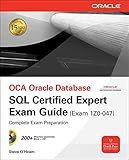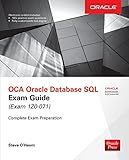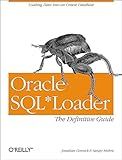Best Oracle SQL Expertise Techniques to Buy in February 2026

OCE Oracle Database SQL Certified Expert Exam Guide (Exam 1Z0-047) (Oracle Press)
- MINT CONDITION GUARANTEES TOP-QUALITY PRODUCTS EVERY TIME!
- SAME-DAY DISPATCH FOR ORDERS BEFORE 12 PM-FAST DELIVERY!
- HASSLE-FREE, NO-QUIBBLE RETURNS FOR COMPLETE CUSTOMER SATISFACTION!



OCA Oracle Database SQL Exam Guide (Exam 1Z0-071) (Oracle Press)



Oracle PL/SQL Language Pocket Reference: A Guide to Oracle's PL/SQL Language Fundamentals



Oracle SQL*Loader: The Definitive Guide
- QUALITY ASSURANCE: EACH BOOK INSPECTED FOR GOOD CONDITION STANDARDS.
- AFFORDABLE PRICES: ENJOY SIGNIFICANT SAVINGS ON QUALITY READS.
- ECO-FRIENDLY CHOICE: SUPPORT SUSTAINABILITY BY BUYING USED BOOKS.



SQL Basics: DATAMINING REFERENCE GUIDE FOR ORACLE DATABASES



Oracle SQL*Plus Pocket Reference: A Guide to SQL*Plus Syntax (Pocket Reference (O'Reilly))


In Oracle, the SELECT statement can be used in conjunction with the CASE WHEN ELSE statement to specify conditions and return values based on those conditions.
The basic syntax for using the CASE WHEN ELSE statement with the SELECT statement is as follows:
SELECT CASE WHEN condition1 THEN value1 WHEN condition2 THEN value2 ... ELSE default_value END FROM table_name;
In this syntax:
- The CASE statement is followed by one or more WHEN clauses that specify the conditions to be evaluated.
- Each WHEN clause is followed by the value to be returned if the condition is met.
- The ELSE clause specifies a default value to be returned if none of the conditions are met.
For example, you could use the following query to select the department name based on the department number:
SELECT CASE WHEN dept_no = 10 THEN 'Accounting' WHEN dept_no = 20 THEN 'Marketing' WHEN dept_no = 30 THEN 'Sales' ELSE 'Other' END FROM employees;
This query would return the department name based on the department number in the employees table, with a default value of 'Other' if the department number does not match any of the specified conditions.
What is the significance of case when else in data transformation in Oracle?
The case when else statement in data transformation in Oracle is used to perform conditional logic, where different actions can be taken based on specified conditions. It allows for comparing a given expression to a list of conditions and executing a corresponding result if the condition is met. The else clause is optional and provides a default value or action to take if none of the specified conditions are satisfied.
Overall, the case when else statement is significant in data transformation as it allows for flexible and powerful data manipulation, enabling data cleansing, standardization, and transformation based on specific business rules and requirements.
What is the role of else statement in case when else in Oracle?
In Oracle PL/SQL, the ELSE statement is used in a CASE statement to provide a default option if none of the previous conditions are met. It acts as a catch-all for any other scenarios that were not explicitly handled in the preceding WHEN clauses. The ELSE clause is optional and can be included at the end of a CASE statement to provide a default value or perform a default action. If none of the WHEN conditions are true, the ELSE block will be executed.
How to troubleshoot errors in case when else statements in Oracle?
- Check the syntax of your case statement: Make sure that the basic syntax of your case statement is correct. The case statement should start with the keyword 'CASE' followed by one or more 'WHEN' conditions and an 'ELSE' statement.
- Verify the data types: Ensure that the data types of the column or variable you are comparing in the 'WHEN' conditions match the data types of the values you are comparing it to.
- Check for NULL values: If the data you are comparing in the 'WHEN' conditions or the result you are trying to return may contain NULL values, make sure to account for this in your 'WHEN' conditions or add an additional condition to handle NULL values.
- Test each condition separately: Debug your case statement by testing each 'WHEN' condition separately to identify which condition is causing the issue. You can do this by adding a simple select statement for each condition to see if it is working as expected.
- Use a default value: If you are getting unexpected results or errors, consider adding a default value in the 'ELSE' statement to handle any scenarios that are not covered by your 'WHEN' conditions.
- Check for conflicts between conditions: Make sure that the 'WHEN' conditions in your case statement do not conflict with each other. If multiple conditions can be true for the same input, the case statement may not return the expected result.
- Use the NVL function: If you are working with columns that may contain NULL values, consider using the NVL function to handle NULL values before evaluating the 'WHEN' conditions in your case statement.
By following these troubleshooting steps, you should be able to identify and resolve any errors in your case statement with 'ELSE' in Oracle.
